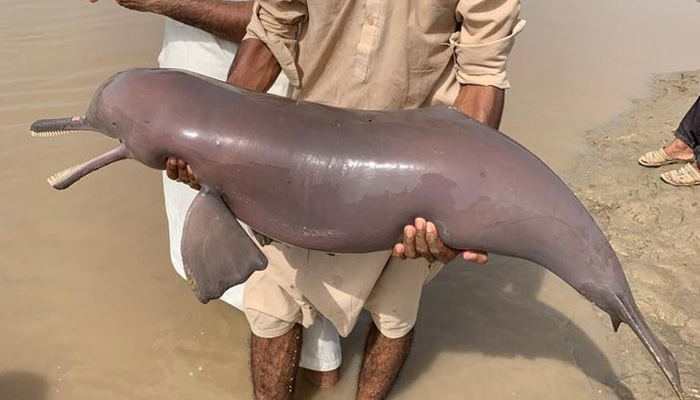Rare Indus dolphin shot dead in Balochistan
In unfortunate incident, unidentified men kill rare Indus River dolphin in Balochistan
August 07, 2023

In Pakistan, where countless people lose their lives in street crimes and other violent activities, one would wonder what a dolphin would have done to be shot dead.
In an unfortunate incident, a rare Indus River dolphin (Platanista gangetica minor), was killed by some unidentified men in Balochistan, it emerged on Sunday.
Sindh Wildlife Department spokesperson confirmed the tragic incident, saying that the dolphin strayed into the Gannang Regulator, Balochistan from Sukkur via the Kirthar Canal of the Indus River.
He said that the irrigation department had informed the wildlife department about the dead dolphin.
Zulfikar Ali Bhutto junior, the grandson and namesake of the founder of Pakistan Peoples Party (PPP) Zulfikar Ali Bhutto, who is an animal rights activist and a culture enthusiast, lamented the incident in a video message shared on Instagram.
Heartbroken by the death of the innocent mammal, Zulfikar said everyone should be in a state of grief and mourning.
"If a bulhan [local name for Sindh's dolphins] is murdered, means you have murdered a part of Sindh," he said, referring to the ban on dolphin hunting imposed by his grandfather, the former prime minister, in a bid to make the endangered specie a protected one.
He then requested those involved in the brutal murder of the dolphin to refrain from doing such acts again.
"These things [dolphins] are very special and we can't lose them," Zulfikar added.
He captioned the video by writing, "I’m in grief and I pray for a kinder society", on the picture and video sharing site.
Blind, with a snout equipped with two rows of sharp teeth, Sindh's Indus river dolphins are endangered species and receive global importance due to their conservation status.
It is one of the only four freshwater dolphin species in the world facing multiple threats, which include unsustainable fishing and entanglement incidents, canal stranding and release of untreated industrial effluents to the river among others.
Living for millions of years in the turbid waters, the mammals eventually went blind and use echolocation, or a form of sonar, for navigation.
There was once a time when a large number of blind dolphins would be found in the Indus River. But now, its habitat has shrunk due to the construction of reservoirs, dams, and barrages for agricultural purposes.











